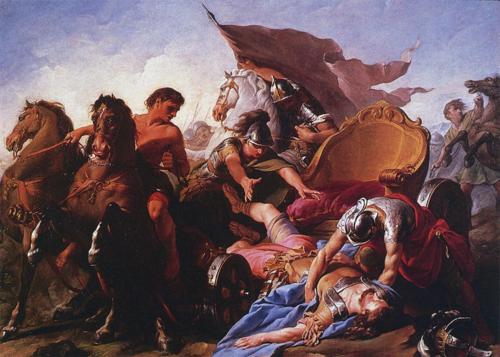
by
Damien F. Mackey
“… it was Herod’s lot to play a role corresponding to that of Sulla
in the parallel Roman revolution”.
Martin Braun
Somewhere in his New Chronology, Anatoly Fomenko muses – as I seem to recall, at least – on who the dictator Sulla may have been in Fomenko’s parallel revised universe.
And I have wondered the same.
And I had liked the idea as suggested by Fomenko, based on the name only, that Sulla of Roman folklore may have been King Saul. But Fomenko had admitted to not having been able to add much more to it than that.
And nor have I been able to. There does not appear to be a fit between Saul and Sulla.
More promising, it seems, would be a comparison of Sulla with Herod ‘the Great’.
This would also include who I believe to be an alter ego of Herod’s:
Antiochus ‘Epiphanes’ and Herod ‘the Great’
Antiochus ‘Epiphanes’ and Herod ‘the Great’. Part Two: ‘The King’ of Daniel 11
the Seleucid king, Antiochus IV ‘Epiphanes’ – hence the inclusion of that name also in my title.
In his 1958 article, “King Herod as Oriental Monarch: Ancient History and the Modern British Mind”, Martin Braun had pointed out several likenesses between Sulla and Herod: https://www.commentarymagazine.com/articles/king-herod-as-oriental-monarchancient-history-and-the-modern-british-mind/
…. Maybe one of these days we shall be given a revaluation of Sulla in which his cruelty will appear balanced or even outweighed by his many good points as a political realist.
There is much food for thought in this connection in a recent book, The Life and Times of Herod the Great, by Stewart Perowne.1 For Herod (d. 4 B.C.E.) [sic] was a sort of Palestinian Sulla, in that he restored and kept order among the Jews for some thirty years through a regime of stick-and-carrot. An expert at Realpolitik, he combined the role of conquering adventurer with that of time-serving diplomatist, of Sulla Bonaparte with that of Talleyrand. Besides, there is to his credit a massive achievement as administrator and builder, as colonizer and protector of frontiers, as promoter of trade and international intercourse. Since the scales today are in any case heavily weighted against his Jewish subjects—the Gibbonian tradition that Judaism is a virulent form of religious exclusiveness having been reinforced or replaced of late by the Toynbeean charge of national fanaticism—Herod is in a position now to cut a pretty fine figure. For has not nationalism come to be regarded as the arch-heresy of mankind? And in an age that puts a premium on administrative efficiency and material welfare, when the dread of anarchy leads men to bow before any tough-minded autocrat, Herod will indeed seem to deserve his cognomen of “great”.
….
Whatever we may think of Herod as a king and a man, there can be no question but that his forceful intervention in the destinies of the Jews had such far-reaching consequences as to place him among the most important historical personages of his time.
To appreciate this, Herod’s career must be seen in the context of the great Jewish revolution which, sparked off by Antiochus Epiphanes (the Seleucid king of Syria whose attempt to Hellenize the Jews provoked the Maccabean revolt) and culminating in the destruction of the Second Commonwealth, not only entailed the transmutation of the Jews into a Diaspora nation, but also paved the way for the acceptance of a Judaic form of religion by the whole Mediterranean world. In this movement it was Herod’s lot to play a role corresponding to that of Sulla in the parallel Roman revolution.
What he, like Sulla, meant to achieve was the restoration and perfection of a system that had broken down: the kind of Hellenistic monarchy aimed at by the Hasmoneans. Yet in undermining the twin pillars of the theocratic establishment—High Priesthood and Sanhedrin—and in applying utterly ruthless coercive methods, he unwittingly created the conditions which led to the speedy annihilation of his own life work by the disruptive forces which he had but temporarily tamed or driven underground. Herod’s political failure thus constitutes a classic instance of what Hegel called the “cunning of Reason.”
….
Further to this, here is a stunning comparison of Sulla, ‘Epiphanes’, and Herod:
Lectures on the history of Rome (from the earliest times to the …, Volume 2, p. 392), edited by Leonhard Schmitz:
[Sulla] retired to Puteoli, where he is said I to have been attacked by phthiriasis, the most disgusting of diseases: his body was covered with ulcers out of which vermin grew. I believe that the fact of his having had this disease cannot be denied; and he deserved such a punishment. It occurs chiefly in the case of tyrants, such as … king … Herod, Antiochus Epiphanes …. Sulla wasted away from this disease; but he died in consequence of an accident. ….
So perhaps did Antiochus Epiphanes (2 Maccabees 9:7):
“Moreover being filled with pride, breathing out fire in his rage against the Jews, and commanding the matter to be hastened, it happened as [Antiochus] was going with violence that he fell from the chariot, so that his limbs were much pained by a grievous bruising of the body”.
No comments:
Post a Comment